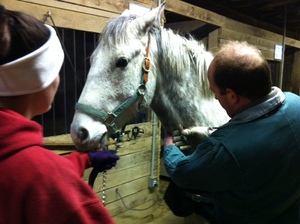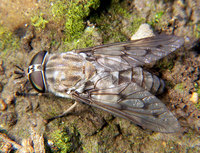Coggins test for Equine Infectious Anemia is important although incidence of the disease in Michigan is low

Dr. Nathan Zauel draws blood for a Coggins test from an unhappy but cooperative patient
Kathy Lundberg | Contributor
Equestrians who plan to buy, sell, transport, or show their horses this year need to be sure they are in compliance with current requirements for transporting horses within and across state lines. In all states, this includes testing for Equine Infectious Anemia (EIA) with a Coggins test.
EIA is a disease caused by the conveniently named Equine Infectious Anemia Virus (EIAV). EIA is also known as Swamp fever, Mountain Fever, Slow Disease, and Coggins Disease.
EIAV is a retrovirus that only affects equines. It does not spread to other animals or people. Another famous, closely related retrovirus is Human Immunodeficiency Virus (HIV).
The cellular blueprints of most living things are made of DNA, which codes for RNA, which in turn directs the production of proteins, the building blocks needed to grow and stay healthy. Sneaky retroviruses are made of RNA. They enter cells and convert themselves to DNA, incorporating into the host cell’s DNA. The retroviruses trick the host cell into becoming a factory for virus reproduction.
To escape the body’s defenses, EIAV (like HIV) mutates frequently, changing its appearance to the cells, so it can continue to slip undetected into more cells and infect more hosts. As with HIV, there is no vaccination available, and infection is permanent.
Veterinarian Leroy Coggins developed a test that identifies antibodies to EIAV in horses’ blood in 1970. This test was adapted worldwide, and is simply known as the Coggins test.
Widespread testing for EIA in the United States began in 1972. More than 100,000 cases have been identified in the US over the years. National testing now yields less than 200 positive cases per year.
Approximately 80 percent of American horses are not tested, and regional pockets of infected horses continue to pose a threat. Regions most likely to harbor pockets of EIA are along the Gulf Coast and the Mississippi River. Texas, Oklahoma, Arkansas, Louisiana and Mississippi are considered special “at risk states.” For informative videos about EIA, see the USDA Animal and Plant Health Inspection Service website.
Horses infected with EIAV generally go through three stages of disease: acute, chronic and asymptomatic carrier.
Acutely infected horses generally have fever and depression. Although the horse many be infected and sick, it may not have a positive Coggins test for more than a month, as the horse forms an immune response. About a third of horses die during acute infection.
Survivors go on chronic infection, in which they have bouts of fever and depression, and appear OK in between. Coggins testing will be positive.
Asymptomatic carriers appear normal, but are still able to transmit disease. Some horses have such mild symptoms as to go undetected, becoming asymptomatic carriers without having been found ill. Infected pregnant mares may miscarry, and 10 percent of their foals are born infected, life-long EIA carriers. Death rate for infected horses varies from 30-70 percent.

Female horse flies need a blood meal for reproduction and inflict a painful bite.
Photo courtesy of en.academic.ru
The accomplices of EIAV are people and biting insects. People transmit EIA by reusing needles, syringes and other tools that transfer one animal’s blood to another. Remember: one horse, one needle! Wash your hands! Blood contaminated objects that must be re-used can be cleaned with dilute household bleach.
Insect vectors are biting flies, horse flies and deer flies, especially the bigger ones whose painful bite causes the horse to move, and the fly’s blood meal to be interrupted. The fly moves with on with its contaminated mouthpiece to the next horse carrying a bit of blood which is injected into a pasture mate. Once infected, a horse is a risk to any other horse nearby.
In Michigan, if a horse tests positive for EIA, that horse and all others on the premise are placed under quarantine and tested by The Michigan Department of Agriculture. Horses testing positive must be permanently quarantined at least ¼ mile from other equines or placed in an insect-free enclosure. Alternatively, it must be euthanized.
If not immediately euthanized, the horse must have a freeze-brand “32A” no less than two inches in height to the left side of its neck, permanently identifying that horse as infected with EIA. Any other horses on the premise of the infected animal must be re-tested 45 days later before being released from quarantine.
Michigan law requires annual EIA testing for any horse entering Michigan from another state, a horse entered into a fair, show, sale, auction, or changing owners. Michigan is moving toward annual testing of all equines, as summarized succinctly by the Department of Agriculture earlier this month.
We can reduce the risk of EIA by keeping barns and pastures as clean as possible, and using methods of fly control. Do not re-use needles or syringes. We can test our animals and only attend horse events where Coggins testing is mandatory.
Although the incidence of EIA in Michigan is rare, it is a very serious disease. Given the frequency with which horses move across state lines, co-mingle with other horses at shows, on trails, and at boarding and training facilities, as well as the fact that most horses in our country are not tested, it behooves us to keep up our guard against EIA. Coggins testing is important!
Kathy Lundberg is a regular contributor on AnnArbor.com's pet section where she addresses topics regarding horses. She is owner of Scio Church Stables. She welcomes your contact via email.


Comments
Std Datings
Thu, Apr 7, 2011 : 4:21 a.m.
Living with HIV/AIDS or other STDs is not shamed or the end of the world. There are currently 33 million people living with HIV in the world. STDdatings. com was created for people to find useful, up-to-date information for herpes/HIV/HPV, find safe date with STDs. many local social support groups we can join and meet others in the same situation.
Riverbend Equine Services
Fri, Apr 1, 2011 : 1:01 p.m.
This is a very comprehensive and easily understood recap of the important Coggins test. Well-timed for the approaching show season. Excellent! Tania Evans, Riverbend Equine Services